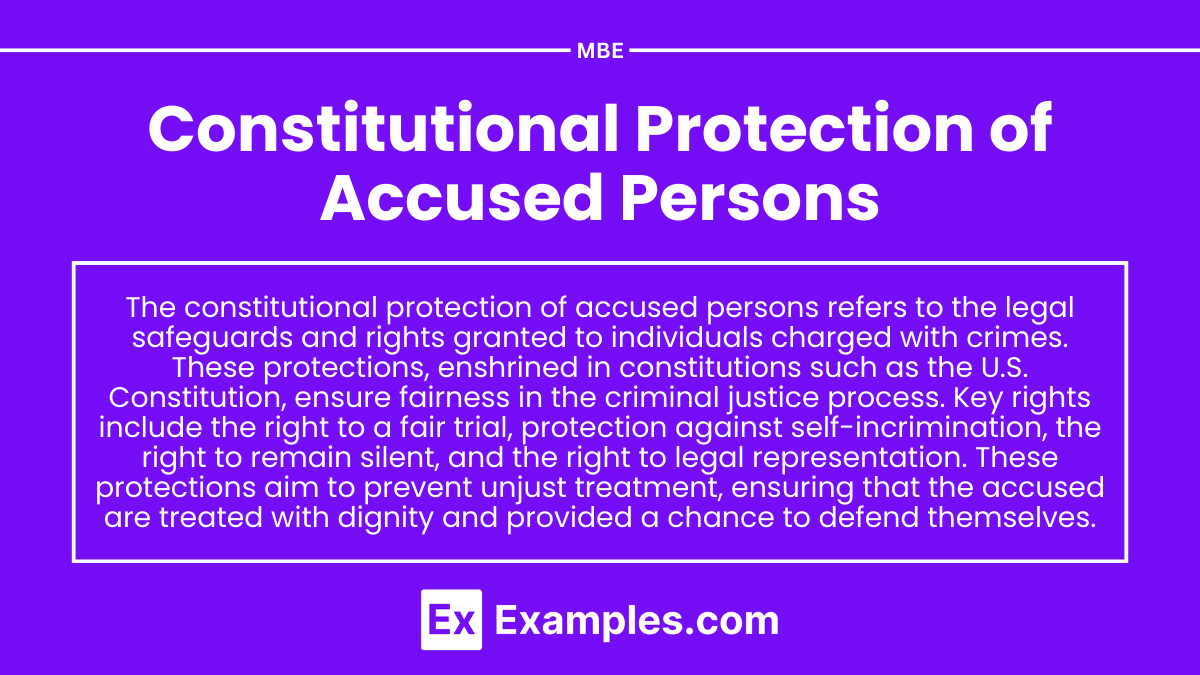Preparing for the exam on Constitutional Protection of Accused Persons requires a solid understanding of key constitutional rights and protections afforded to individuals under U.S. law. This includes familiarity with the Sixth Amendment right to counsel, the Fifth Amendment privilege against self-incrimination, and the Fourth Amendment protection against unreasonable searches and seizures. Mastery in applying these constitutional protections in real-world scenarios, such as ensuring due process and upholding fair trial principles, is essential for navigating complex legal questions involving accused persons.
Learning Objectives
In studying Constitutional Protection of Accused Persons for the MBE exam, you should learn to understand its critical role in safeguarding individual rights during criminal proceedings. The U.S. Constitution guarantees essential protections to the accused, including the right to due process, the right to remain silent under the Fifth Amendment, and the right to a fair trial under the Sixth Amendment. Understanding the application of these protections in real-world scenarios, such as the exclusionary rule, speedy trials, and rights to counsel, is essential. Mastery of constitutional protections ensures accurate issue-spotting, refined reasoning, and strong performance, which are critical for success in the exam.
What is Constitutional Protection of Accused Persons?
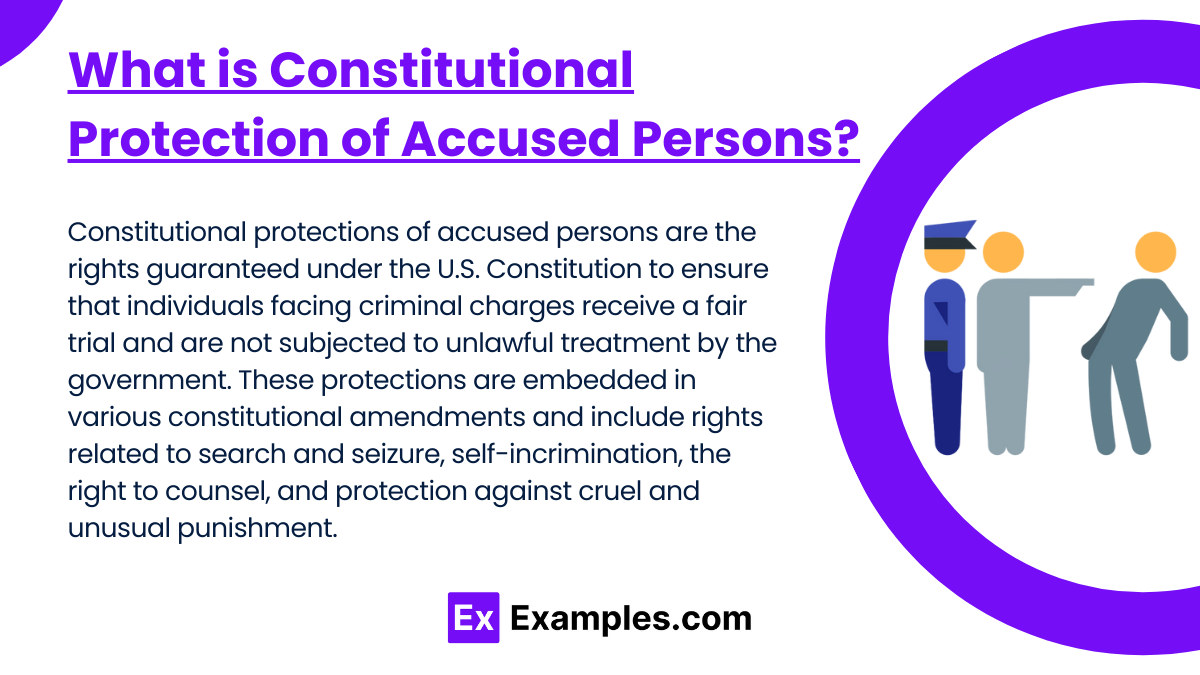
Constitutional protections of accused persons are the rights guaranteed under the U.S. Constitution to ensure that individuals facing criminal charges receive a fair trial and are not subjected to unlawful treatment by the government. These protections are embedded in various constitutional amendments and include rights related to search and seizure, self-incrimination, the right to counsel, and protection against cruel and unusual punishment. The purpose of these rights is to prevent abuses by law enforcement and to maintain the integrity of the justice system.
Key Elements of Constitutional Protection
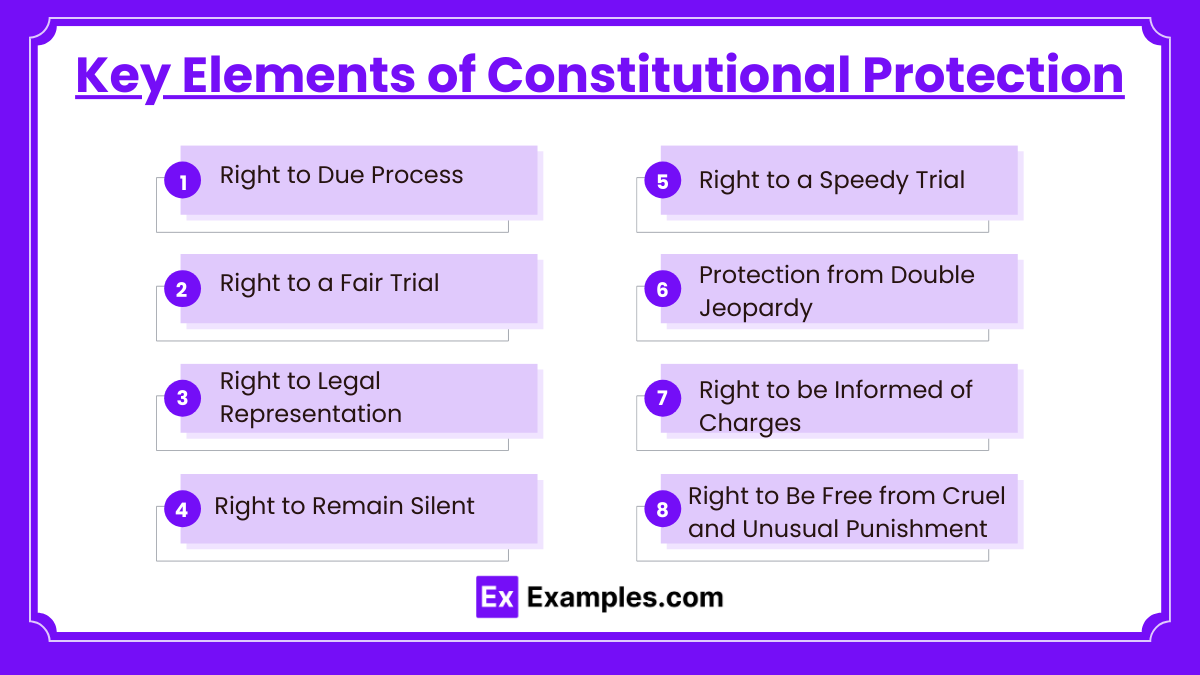
Right to Due Process:
This guarantees that individuals are not deprived of life, liberty, or property without fair legal proceedings. It ensures that all laws and proceedings are fair and that individuals are not subjected to arbitrary actions by the government.
Right to a Fair Trial:
Accused individuals have the right to a fair and impartial trial. This includes the right to be heard by a competent, independent, and unbiased tribunal, typically a court.
Right to Legal Representation:
Accused persons have the right to legal counsel, and if they cannot afford one, the state must provide an attorney for them.
Right to Remain Silent (Protection Against Self-Incrimination):
In many legal systems, accused persons have the right not to testify against themselves. This is a protection against self-incrimination, ensuring that no one can be forced to provide evidence that would incriminate them.
Right to a Speedy Trial:
The accused have the right to be tried within a reasonable time. This prevents prolonged detention or indefinite delay in trial, which could otherwise infringe upon an individual’s rights.
Protection from Double Jeopardy:
The principle of double jeopardy protects an individual from being tried twice for the same offense, preventing harassment through repeated prosecutions for the same crime.
Right to be Informed of Charges:
Accused persons must be informed of the charges against them in a timely and clear manner, ensuring they can prepare a defense.
Right to Be Free from Cruel and Unusual Punishment:
The accused are protected from inhumane treatment, which includes torture, degrading punishment, or excessively harsh sentences that do not fit the nature of the offense.
Purposes of Constitutional Protection of Accused Persons
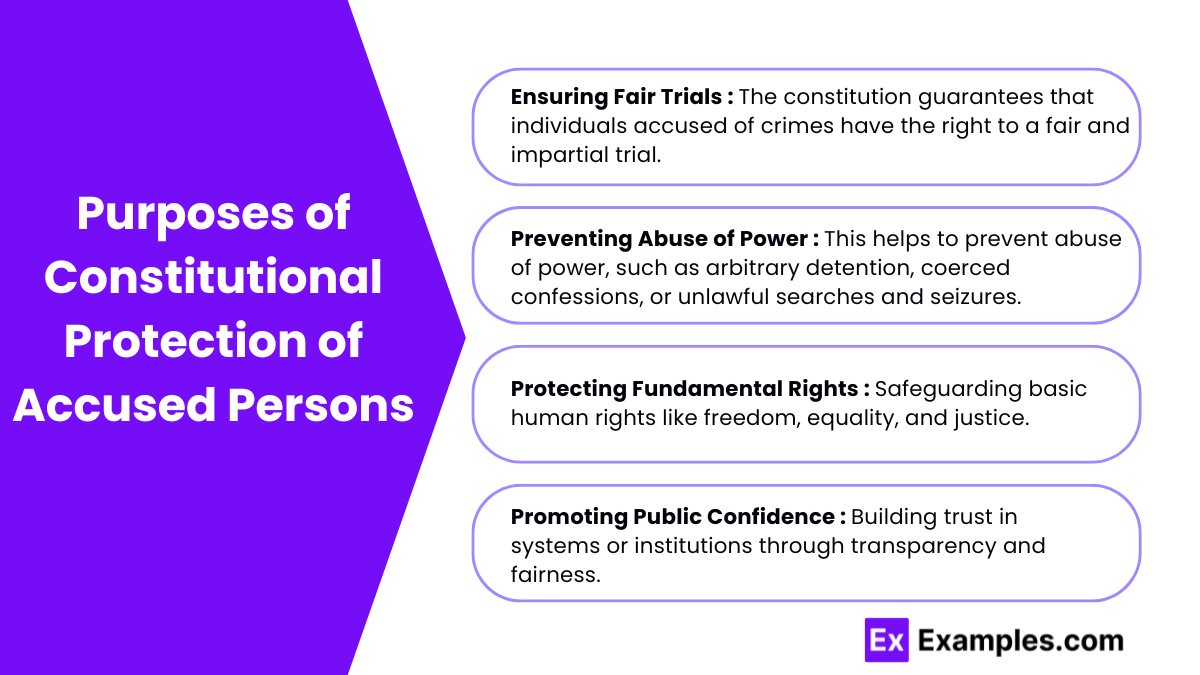
The constitutional protection of accused persons serves several key purposes in ensuring fairness, justice, and the protection of individual rights within the criminal justice system. Here are the primary purposes:
Ensuring Fair Trials: The constitution guarantees that individuals accused of crimes have the right to a fair and impartial trial. This includes access to legal representation, a fair judge, and an unbiased jury. These safeguards prevent wrongful convictions and ensure that justice is served.
Preventing Abuse of Power: Constitutional protections limit the power of the government and law enforcement agencies. This helps to prevent abuse of power, such as arbitrary detention, coerced confessions, or unlawful searches and seizures.
Protecting Fundamental Rights: Accused persons are entitled to fundamental human rights, including the right to remain silent, protection from self-incrimination, and freedom from cruel and unusual punishment. The constitution safeguards these rights to ensure that individuals are not subject to undue harm or coercion during the criminal process.
Promoting Public Confidence: By ensuring that accused persons are treated fairly and justly, constitutional protections help to maintain public confidence in the legal system. When the public perceives the system as fair, it fosters trust and respect for the law.
Importance of Constitutional Protection of Accused Persons
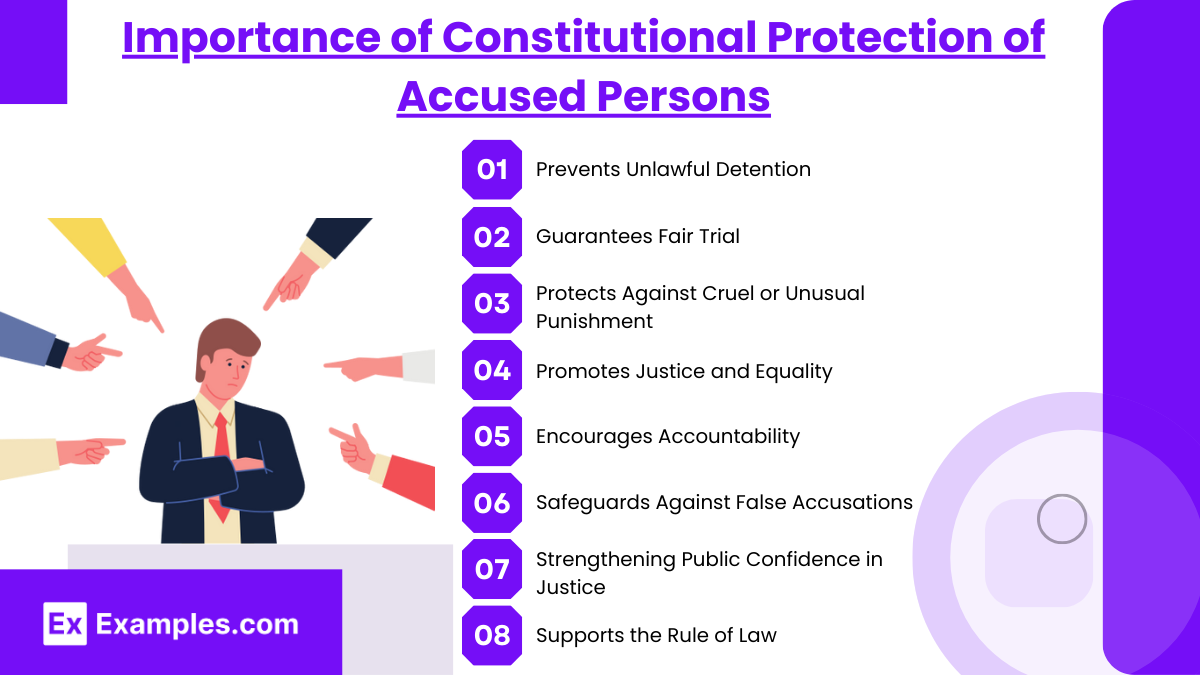
The constitutional protection of accused persons is essential in safeguarding individual rights and ensuring a fair and just legal system. The importance of these protections can be summarized as follows:
Prevents Unlawful Detention: Constitutional protections prevent arbitrary detention by ensuring that individuals cannot be detained without due process. This ensures that accused persons are not subjected to unjust imprisonment without sufficient legal cause.
Guarantees Fair Trial: Accused persons are entitled to a fair and impartial trial. Constitutional safeguards, such as the right to counsel, the right to remain silent, and the presumption of innocence, protect individuals from wrongful convictions and abuse of power by authorities.
Protects Against Cruel or Unusual Punishment: The prohibition of cruel and unusual punishment, as outlined in many constitutions (such as the Eighth Amendment in the U.S.), ensures that accused persons are not subjected to excessive or inhumane treatment, regardless of their alleged crimes.
Promotes Justice and Equality: Constitutional protections aim to ensure that all individuals, regardless of their background, have equal access to justice. These protections prevent discrimination and ensure that legal processes are followed consistently for all accused persons.
Encourages Accountability: By guaranteeing the rights of accused persons, the law holds law enforcement and the judicial system accountable. It ensures that authorities do not overstep their bounds, allowing for greater trust in the justice system.
Safeguards Against False Accusations: Constitutional protections, such as the right to cross-examine witnesses and to present evidence, help protect individuals from being wrongfully convicted due to false accusations or flawed evidence.
Supports the Rule of Law: The constitutional protection of accused persons reinforces the rule of law by ensuring that individuals are judged by law rather than by the whims of powerful figures. It emphasizes that everyone is entitled to equal protection under the law.
Strengthening Public Confidence in Justice: Constitutional protections foster trust in the legal system by demonstrating a commitment to fairness, due process, and respect for individual rights, even for those accused of crimes.
Examples
Example 1. Right to Due Process
One of the fundamental constitutional protections for accused persons is the right to due process under the 5th and 14th Amendments of the U.S. Constitution. This ensures that individuals are given a fair and impartial trial, with notice of the charges, the opportunity to contest the evidence, and the right to be represented by an attorney. The use of this protection guarantees that the government cannot deprive a person of life, liberty, or property without following proper legal procedures.
Example 2. Protection from Self-Incrimination
The 5th Amendment also protects accused persons from self-incrimination. This means that individuals cannot be compelled to testify against themselves in a criminal case. For example, during an interrogation, a suspect has the right to remain silent to avoid providing information that could be used against them in court. This constitutional safeguard ensures that confessions or statements made under duress or coercion are not admissible as evidence.
Example 3. Right to a Fair and Speedy Trial
Under the 6th Amendment, accused persons have the right to a speedy and public trial by an impartial jury. This ensures that the prosecution does not have an indefinite amount of time to delay legal proceedings, which could result in prejudice against the accused. This protection is critical for ensuring that justice is not only done but seen to be done in a timely manner.
Example 4. Protection Against Double Jeopardy
The Double Jeopardy Clause of the 5th Amendment protects accused persons from being tried twice for the same offense. Once an individual has been acquitted or convicted, they cannot be retried for the same crime in the same jurisdiction. This prevents the government from repeatedly prosecuting individuals for the same offense, thereby safeguarding against abuse of power and unnecessary legal burden on the accused.
Example 5. Right to Counsel
The 6th Amendment guarantees the right of the accused to have legal representation during criminal prosecutions. If an individual cannot afford an attorney, the court is required to provide one. This protection ensures that the accused has the opportunity to fully understand the charges against them, mount a proper defense, and ensure a fair trial process. It is a cornerstone of ensuring fairness in the justice system.
Practice Questions
Question 1
Which of the following rights is NOT explicitly guaranteed under the Sixth Amendment to the U.S. Constitution for accused persons?
A) The right to a speedy trial
B) The right to an impartial jury
C) The right to be informed of the nature and cause of the accusation
D) The right to remain silent
Correct Answer: D) The right to remain silent
Explanation: The Sixth Amendment guarantees several key rights to individuals accused of crimes, including the right to a speedy and public trial, an impartial jury, and the right to be informed of the charges against them. However, the right to remain silent is not explicitly mentioned in the Sixth Amendment; it is protected under the Fifth Amendment, which includes the protection against self-incrimination. The Fifth Amendment allows individuals to refuse to testify or provide evidence that might incriminate themselves.
Question 2
Under the U.S. Constitution, which amendment ensures protection against double jeopardy for an accused person?
A) Fifth Amendment
B) Sixth Amendment
C) Fourteenth Amendment
D) Eighth Amendment
Correct Answer: A) Fifth Amendment
Explanation: The protection against double jeopardy, which means being tried twice for the same offense, is explicitly guaranteed by the Fifth Amendment. This amendment ensures that no person shall "be subject for the same offense to be twice put in jeopardy of life or limb." This is a critical constitutional protection that prevents the government from repeatedly prosecuting a person for the same crime once they have been acquitted or convicted.
Question 3
The "Miranda rights" that inform an accused person of their right to remain silent and to an attorney are derived from which U.S. Constitutional Amendment?
A) First Amendment
B) Fifth Amendment
C) Sixth Amendment
D) Fourteenth Amendment
Correct Answer: B) Fifth Amendment
Explanation: The "Miranda rights" originate from the Fifth Amendment’s protection against self-incrimination. In the landmark Miranda v. Arizona case (1966), the U.S. Supreme Court ruled that suspects must be informed of their rights to remain silent and to have an attorney present during questioning to ensure that their Fifth Amendment rights are not violated. While the Sixth Amendment also provides for the right to counsel during prosecution, the Miranda rights are primarily based on the Fifth Amendment's protections related to self-incrimination.

